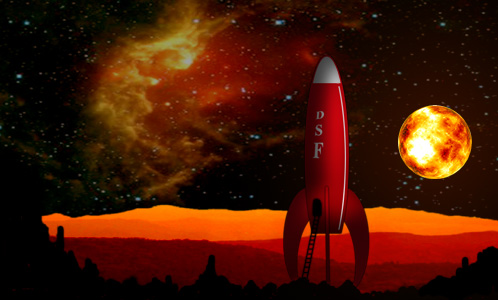
art by Jonathan Westbrook
What Jerry Knows
by Shane D. Rhinewald
Jerry sits in his favorite chair--the one with the red, plastic back. He says the others just don't feel right. His eyes dart around the room with boyish wonder, but they're a man's eyes, milky with cataracts, edged with wrinkles. He looks at the black and white pictures on the wall depicting historic events and gives me the date (down to the time of day in some cases) for everything from the Kennedy assassination to the shooting at Columbine.
"Jerry, how do you feel today?" I ask, tapping my pen. Every session starts with a similar line of questioning; Jerry likes the routine. "Do you know how you feel?"
"No," he says. His eyes return to the pictures on the walls, and he launches into a lecture about the Cuban Missile Crisis. He likes to say Khrushchev.
I let him finish. "Do you know what a savant is, Jerry?"
His tongue flicks across his lips. He recites, "A person with a developmental disorder that has one or more areas of expertise, ability, or brilliance that contrasts with the individual's overall limitations."
"And do you know any savants?"
"No," Jerry says. He sounds disappointed, but a picture of Dwight Eisenhower delivering the presidential farewell address distracts him.
"Think about my question again. Do you know any savants, Jerry? Do you know someone really good at something, someone really smart?"
He ignores my question and tells me that Eisenhower was the 34th president and died on March 28, 1969. It was a Friday.
"OK. A new question then, Jerry. Do you know what planet we're on?"
That gets his attention. He points at a picture of an astronaut putting a flag in a green field.
"It's not a planet. It's Baglioni VIII, the smallest moon of the gas giant Telious III, which revolves around a sun half the size of the one Earth does. We're 8.2724 light years from Earth, or 8.27243 if you want me to take it out another decimal. Or--"
"That's good enough, Jerry," I say. "Do you know why we left Earth?"
He shakes his head and demands juice. I tell him he'll have to wait until we're done talking, and after promising him both apple and cranberry, he agrees to continue answering questions.
"Tell me about the Third World War," I say, pointing to a picture on the wall showing a torn American flag being raised by two bloodied soldiers.
"The Third World War started in 2107 AD as a proxy war between Israel and Iran, through which the United States and Russia reignited the Cold War," he says. He adds with a laugh, "Khrushchev. Khrushchev."
"And what happened to the oceans after?"
He pauses. "The fallout from the war ate a hole in the ozone layer that caused the icecaps to melt more quickly, and the oceans rose 20.45 centimeters a year."
"And what did that mean for humanity? What did people fear? What was the feeling at the time?"
Jerry shrugs. He'd rather point out more pictures and fire off the dates of key events in the Third World War, ending with the Truce of Earth on May 2, 2121. When he finishes, he shouts that he wants his juice now, so I put my notepad aside and go ask an aide to fetch it for him. While she's gone, I resume my line of questioning.
"Jerry, do you know the formula that made anti-matter propulsion possible?"
He tells me, and I understand none of it. It's just strange names and numbers that sound like mindless ramblings.
"And do you know it's your formula? You came up with it, Jerry. You created that."



